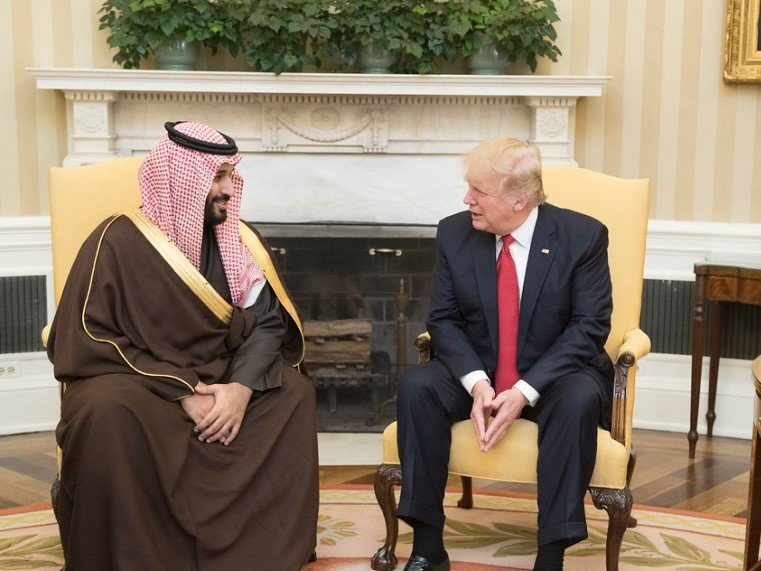US President Donald Trump brushed off criticism over bypassing Israel on his Middle East trip, insisting from Air Force One that his meetings in Riyadh and Doha serve Israel’s interests and boost regional stability.
The remarks came during a whirlwind tour where Trump met with Saudi and Qatari leaders amid ongoing talks over the war in Gaza and negotiations to release hostages held by Hamas. Despite skipping Jerusalem, the president was quick to frame his diplomatic overtures in the Gulf as indirectly supporting Israel, both politically and strategically.
Hostage Release Drives Trump’s Narrative
Trump didn’t hold back crediting the US for the safe release of Edan Alexander, a dual Israeli-American citizen freed from Hamas captivity. He claimed American intervention was the deciding factor.
“If it weren’t for us, he wouldn’t be living right now,” Trump said bluntly, suggesting that the US might deserve “the most credit” for the rescue operation. His comments implied that behind-the-scenes pressure from Washington played a key role, though he acknowledged Israeli forces were actively engaged in the conflict.
Asked whether Israel deserved recognition too, Trump struck a diplomatic tone before doubling down on his own administration’s contributions:
“They’ve been fighting a long time, they’re warring… they deserve a lot of credit. I think my people deserve a lot of credit. Maybe the most credit.”
Skipping Israel, But Not Skipping Support
Trump’s decision not to visit Israel — especially during a war — raised eyebrows. But he tried to frame it as part of a larger strategy, not a snub.
From his perspective, strengthening relationships with Saudi Arabia and Qatar actually shores up Israel’s position. “Having a relationship like I have with these countries… I think it’s very good for Israel,” he said, brushing off concerns that Israel is being pushed to the sidelines.

This trip, he hinted, wasn’t about optics. It was about realpolitik. Or, at least, his brand of it.
Tensions, Truces, and Backchannels
Trump’s meetings with Crown Prince Mohammed bin Salman in Riyadh and Emir Sheikh Tamim bin Hamad Al Thani in Doha reportedly focused on more than just oil or military deals. The issue of hostages — still held by Hamas — and a broader ceasefire deal dominated the closed-door talks.
Several sources close to the discussions said that both Gulf states are quietly brokering negotiations, with Qatar playing a central mediator role given its contacts with Hamas. Trump didn’t delve into specifics, but emphasized that hostage releases would continue “step by step.”
That phrase caught attention. It echoed a broader, unspoken strategy: no sweeping deals, just slow, calculated progress.
Critics Cry Foul, Allies Stay Quiet
Not everyone bought Trump’s argument. Critics back home and in Israel questioned why the president would skip a war-torn ally in favor of talking to leaders who’ve maintained ties with Hamas.
Former Israeli officials, speaking anonymously, called the optics “problematic” and “confusing,” especially given the gravity of the situation on the ground in Gaza.
But publicly, Israeli leadership stayed mostly silent, likely to avoid a diplomatic rift. After all, Washington remains its most powerful backer.
In contrast, some US lawmakers raised concerns about over-relying on Gulf states for conflict mediation. One senior senator reportedly warned: “Outsourcing peace to Doha doesn’t guarantee peace for Jerusalem.”
What’s at Stake Politically
For Trump, the trip offered more than foreign policy leverage. It was also a political play — an attempt to look presidential as the 2026 campaign cycle starts revving up.
He’s betting that a high-profile hostage rescue and assertive diplomacy will resonate with voters craving strength abroad. It’s a return to his 2020 strategy — flaunting bold, unconventional international moves.
And the rhetoric matched the ambition. Trump was confident, brash, even dismissive of nuance. His message boiled down to this: no one else could’ve done it.
Behind Closed Doors, Quiet Calculations
While the media spotlight focused on Trump’s tough talk and headlines, much of the real work was happening away from cameras.
Qatar has emerged — once again — as a vital middleman. Trump acknowledged that. So did diplomats in Doha, who hinted at more hostage releases “within days.”
Saudi Arabia, meanwhile, remains publicly cautious. Privately, though, sources suggest bin Salman is pushing for a resolution that doesn’t alienate Washington — or the broader Arab public.
Trump wants results. The Gulf wants calm. Israel wants security. It’s a messy triangle, but one all parties seem willing to juggle for now.
Looking Ahead: More Hostages, More Pressure
The president promised more hostages would be freed — “step by step.” But no timeline was offered. No new deals announced.
There’s growing pressure on both sides to move faster. Families of captives have grown restless. Protests in Israel are intensifying.
Yet Trump kept his messaging focused. He cast the US as indispensable. A powerbroker. And in his view, the only reason some hostages are alive.
Whether that holds true in coming weeks could determine if this trip really was — as he claimed — “very good for Israel.”
